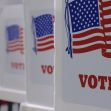The Department of Justice (DOJ) has reviewed SB 202, Georgia’s “Election Integrity Act of 2021”, and found that it is far from deserving of a name that requires honesty and strong moral principles. Instead, it filed a complaint against Georgia in federal court after finding the new state law to be discriminatory, racially motivated, and in violation of the federal Voting Rights Act.
The complaint, filed in The United States District Court for the Northern District of Georgia, Atlanta Division, on June 25, states that SB 202 specifically “intended to deny or abridge the right of Black Georgians to vote on account of race or color.”
In a speech by Assistant Attorney General Kristen Clarke, which accompanied the filing of the complaint, the DOJ Civil Division head said, “Our complaint today alleges that several provisions of SB 202 were passed with a discriminatory purpose.”
She quickly provided background information that explained the complaint. Georgia’s legislative actions, she stated, “occurred at a time when the Black population in Georgia continues to steadily increase, and after a historic election that saw record voter turnout across the state, particularly for absentee voting, which Black voters are now more likely to use than white voters.”
The complaint cites data that documents the growth of the State’s black population. The American Community Survey concluded that in the past nine years, the state’s Black population increased by 13.9%, bringing the Black proportion of the State to 31.9%. While Black voters have been historically less likely to vote by mail, that number spiked significantly in the Senate runoff and showed that Black voters cast more ballots than white voters.
President Biden won the presidential election in Georgia by 49.5% to 49.2% for Donald Trump. In the Senate runoff that followed, both Democrats Jon Ossoff and Rev. Raphael Warnock defeated their Republican challengers.
Gov. Brian Kemp (R-GA) signed the new voting law on March 27. Several provisions were challenged in DOJ’s lawsuit which targets those that:
· Prohibit government offices from mailing unsolicited absentee ballot applications, unless they are specifically requested by the voter or an authorized relative of the voter;
· Impose fines on any non-government organizations that send absentee ballot applications;
· Require voters without certain identification numbers to make copies of another form of identification each time they request an absentee ballot;
· Reduce the time period allowed for absentee ballot applications;
· Restrict the availability and use of drop boxes through orchestrating a “precipitous decline in drop box availability in the counties that are home to the largest number of black voters in the State;”
· Require that new applications for absentee ballots be made for each election;
· Prohibit giving food or water to voters waiting in line to vote, preventing groups such as churches and non-profit organizations from distributing sustenance to voters who must wait in long lines to vote;
· Prohibit all out-of-precinct provisional ballots that are cast before 5 p.m. on election day and requiring voters who cast their ballots after that early deadline to execute a sworn statement, witnessed by a poll official, stating the reason why the voters are unable to vote at their assigned precinct.
The complaint charges, “The Georgia legislature enacted SB 202 with knowledge of the disproportionate effect that these provisions would have on Black voters’ ability to participate in the political process on an equal basis with white voters.” The success of Black-led mobilization efforts spurred by the questionable defeat of organizer Stacey Abrams for governor led to a large upsurge in Black voters and their use of absentee ballots.
DOJ’s complaint began by stating the Voting Rights Act authorizes the Attorney General to “file a Civil action” on behalf of the U.S. seeking injunctive, preventive, and permanent relief…” Section 2 of the Act “prohibits the enforcement of any voting practice or procedure that has the purpose of denying or abridging the vote on account of race, color or membership in a language minority group.” Clarke’s remarks charged “SB 202 violates this federal law.” She stated, “The Attorney General has made clear that the Justice Department will not stand idly by in the face of unlawful attempts to restrict access to the ballot. Today’s filing demonstrates the commitment to this charge.”
Georgia’s long history of “official racial discrimination against Black citizens with regard to voting is longstanding, well-documented, and recognized by Federal courts,” according to the DOJ complaint.” As a result, since the passage of the Voting Rights Act of 1965, the State was required to obtain “pre-clearance” from a three-member judicial panel before making any changes in voting. That was changed in 2013 when the Supreme Court overturned a key provision of the 1965 Act that had allowed the Justice Department to stop states from passing laws viewed as facilitating voter discrimination.
Clarke’s speech detailed an additional impetus for the bill, related to the process by which Georgia passed SB 202. “The Georgia legislature passed SB 202 through a rushed process that departed from normal practice and procedure. The version of the bill that passed the State Senate on March 8th was three pages long. Days later the bill ballooned into over 90 pages in the House. The House held less than two hours of floor debate on the newly inflated SB 202 before Governor Kemp signed it into law the same day,” she explained.
With this shameful background fully detailed, DOJ asked the Court to declare that the challenged provisions, outlined above, violated the Voting Rights Act. It asked that the State of Georgia be enjoined from enforcing its requirements, require the appointment of Federal observers for future elections, and reinstate the preclearance requirement.
The complaint did not request the complete suppression of the Georgia law, nor did it include a request for an injunction of a controversial provision that allows State officials to supersede voter choices by taking over local election boards.
The chance for success, however, is far from clear. Several media outlets point to what VOX called “a judiciary that is increasingly hostile toward voting rights claims.” The Atlanta Journal-Constitution said the bill faces “a treacherous path.” The U.S. Supreme Court is currently deliberating the constitutionality of several Arizona laws that could impact the life of the new Georgia law. One requires officials to discard provisional ballots cast by voters who vote at the wrong precinct and the other limits the collection of ballots by third parties. The 6-3 conservative majority VOX notes “has shown a great deal of hostility toward voting rights generally and the Voting Rights Act in particular.”
Many of the restrictive practices that the DOJ wants to be eliminated would be gone without judicial review if Congress passes the John Lewis Voting Rights Advancement Act or the For the People Act. The latter has already failed to advance to a vote in the Senate and the fate of the John Lewis Act remains questionable.
But hope remains. The New York Times reports, “The complaint also shows that the Biden administration intends to invoke the remaining tools the Justice Department has to aggressively fight state actions that it sees as potentially disenfranchising minority voters.” The Los Angeles Times calls it “A bad law,” and voter’s rights groups throughout the country pledge to fight on.






